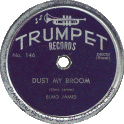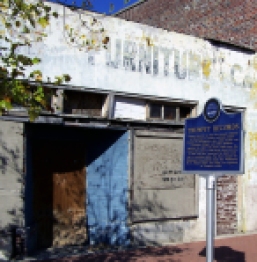309 Farish Street, the home of Trumpet Records, is a ruin.

The impact of Trumpet Records on American music has been profound and lasting, but the site of the studio is rapidly decaying. The building that housed this jewel in the crown of Mississippi music has not only lost its luster, but it’s become a dilapidated shell. While the roof and walls are intact, they’re barren and pitted, covered with patches of peeling paint and without windows, open to the erosive elements of weather.
Musician Sherman Lee Dillon is the driving force behind a group of people who seek to preserve and restore the building with an eye to commemorating Trumpet Records and its music. “What we’re trying to do is ensure that the old building where these legends laid down some the most famous tracks in Mississippi music is preserved. Maybe we can even to get some momentum going towards the restoration of Farish Street itself.”
Dillon notes that the 30-year efforts to restore the Farish Street District by massive infusions of public funding have stalled. “We think it’s worthwhile to give private initiative a chance.”
To that end, Dillon and his group have secured a lease on 309 North Farish Street, one of the few privately-owned properties in the Farish Street Historical District. Dillon said that he asked the owners not to lease or sell 309 Farish until he had an opportunity to restore it.

“They have stuck to their word for three years and not seriously entertained any other offers,” he said. “But I have not been able to find any pockets to get money from, and I am in not in a situation for matching funds. The city does nothing to support the project, even though the mayor drops by from time to time. I can’t wait any longer. If I can’t get the money to restore it, Trumpet Records goes on the block.”
Dillon said that once the building is secured, he will work on creating a nonprofit business, a museum and a recording studio. “I am personal friends with musicians who have played with several Mississippi blues people, Johnny Taylor, Milton, Bobby Rush, Dorothy Moore, BB King and Albert King.” Dillon points out that while Trumpet had some national recognition, their recordings of local celebrities might be one of the most interesting aspects of the proposed museum.

“The problem is that there’s no money for restoration,” Dillon said. “The agreement I have with the owners is for two years’ rent, $48,000, paid in advance within 30 days. That money will be used exclusively for the restoration of 309. Any money that comes from the operation of 309 for the next two years will be to further the services of the restoration.
“All I can say is that if this doesn’t work, a golden opportunity has been missed.”
Details available at Save Trumpet Records

